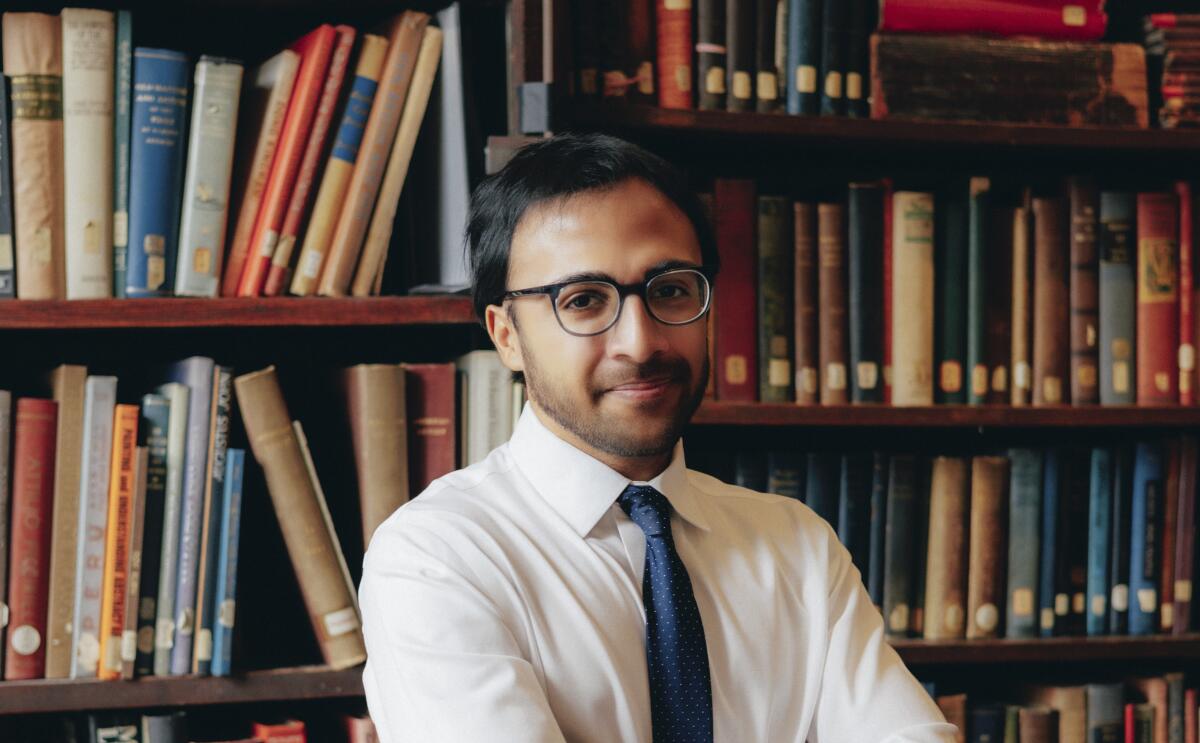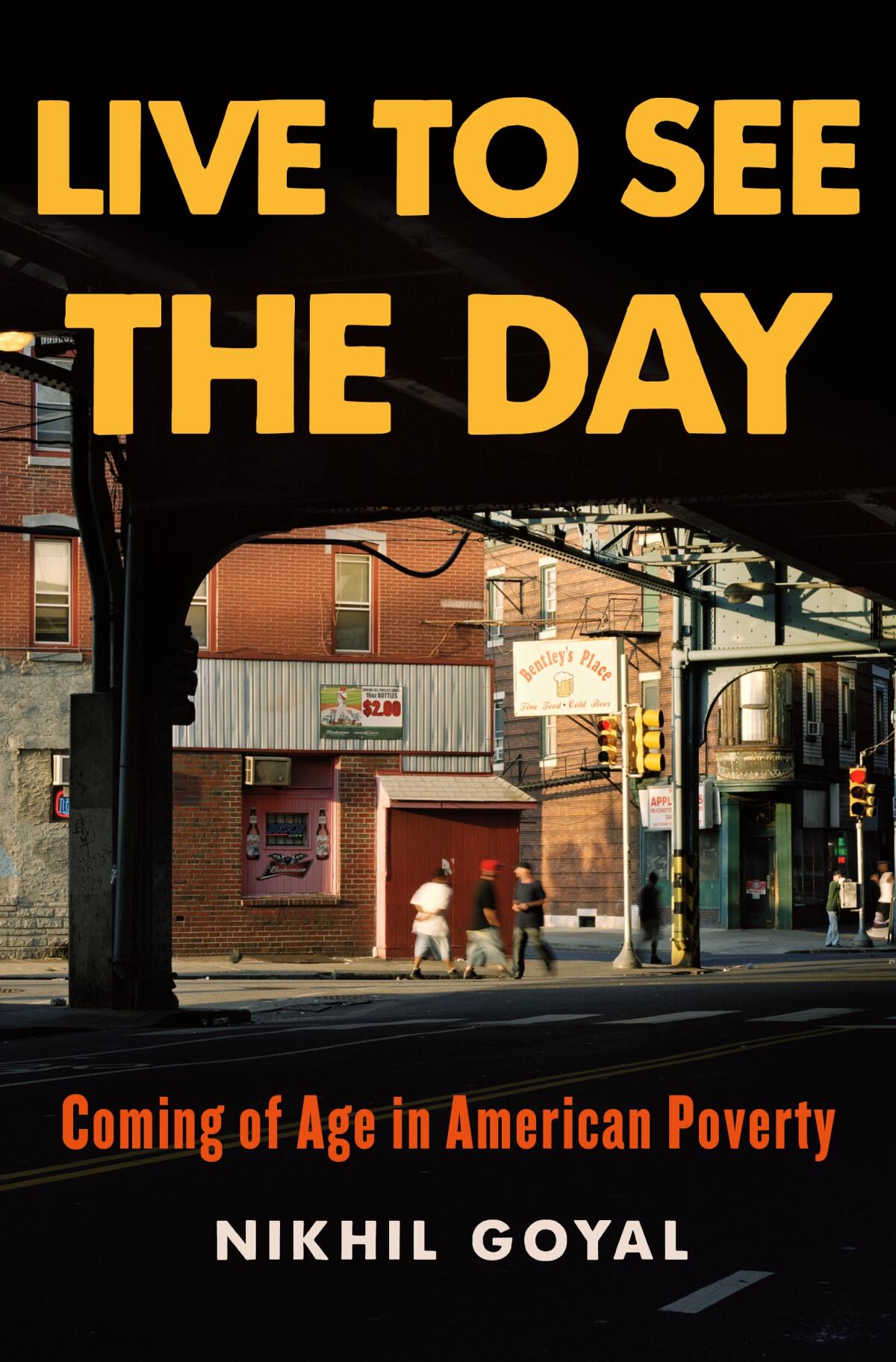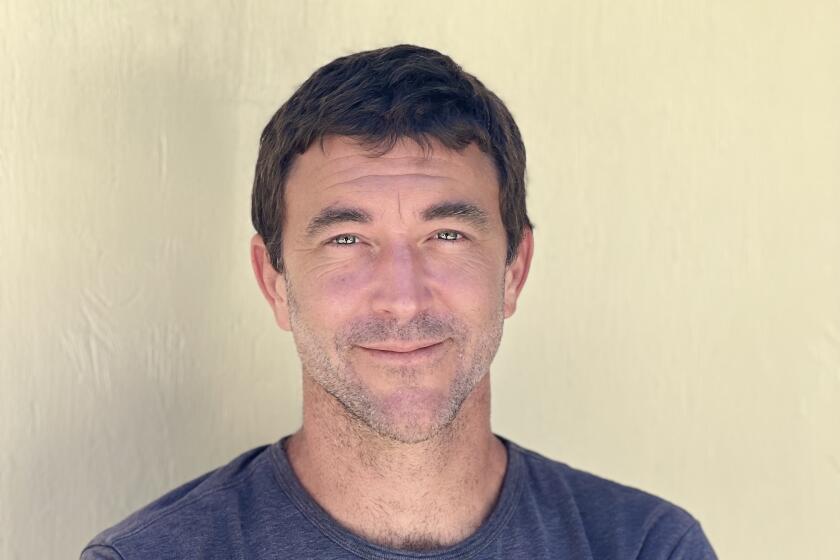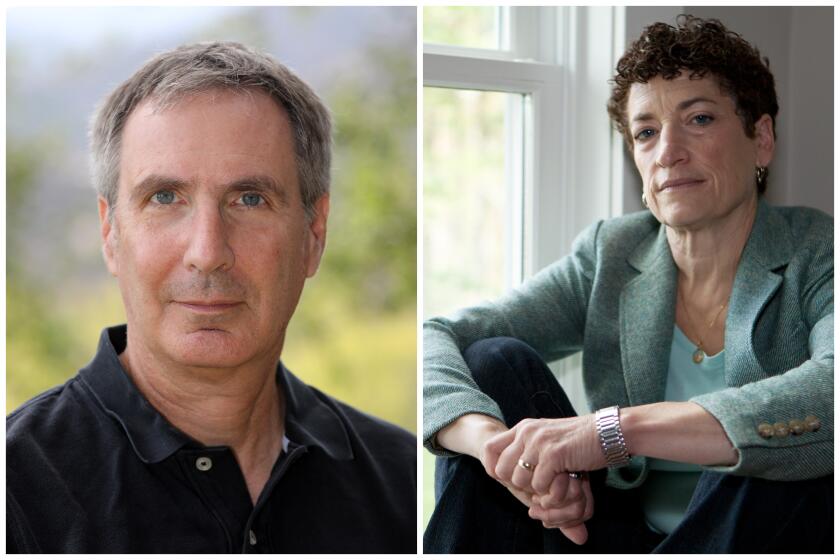From Bernie’s office to Philly’s streets: Why a policy wonk turned to immersive journalism

- Share via
On the Shelf
Live to See the Day: Coming of Age in American Poverty
By Nikhil Goyal
Metropolitan: 352 pages, $30
If you buy books linked on our site, The Times may earn a commission from Bookshop.org, whose fees support independent bookstores.
“Happy birthday,” Nikhil Goyal said to a teen he’d gotten to know in Philadelphia.
“I’m glad I made it another year,” the teenager responded matter-of-factly.
“To me that was so astonishing,” Goyal recalled in a recent video interview. He had been studying the distressed Philly neighborhood of Kensington as part of his research toward a Ph.D. at Cambridge University, but that kid’s response was in part what galvanized the policy expert to expand his work into a book, out this month, “Live to See the Day: Coming of Age in American Poverty.”
“I grew up in middle-class neighborhoods in Long Island and had never personally faced this idea,” Goyal said. “It was harrowing to talk to young men who thought this way because they were involved in the drug trade or were just going about their lives but worried about falling prey to street violence or a predatory criminal justice system.”
In ‘Children of the State,’ award-winning writer Jeff Hobbs spent months inside juvenile facilities. It was an experience of heartbreak and hope.
A book of both big ideas — reflecting Goyal’s former job as a senior policy advisor to Sen. Bernie Sanders — and close-up immersive journalism, “Live to See the Day” grew out of Goyal’s interest in America’s high-school dropout crisis. A friend, who runs a progressive educational program called Big Picture Learning, suggested he embed with the organization’s El Centro de Estudiantes, an alternative high school that offered a last chance to struggling students.
Goyal interviewed hundreds of people for his graduate research, but his book zooms in closely on three Puerto Rican boys — Ryan, Giancarlos and Emmanuel — intertwining their tough stories with those of their mothers to show the lasting impact of intergenerational poverty, trauma and violence.
Ryan, whose family is frequently forced to move, never gets the proper attention for his ADHD; his misbehavior eventually lands him in the juvenile justice system before sending him ricocheting from one school to another. After Giancarlos gets in trouble with administrators for leading protests, a zero tolerance policy results in his expulsion. Emmanuel’s problems start closer to home, where his mother’s boyfriend is violent, a rat bites him as he sleeps and his family ultimately rejects him for being queer. He ends up homeless, searching for a new family and a way forward.
Despite the best efforts of El Centro’s educators, these boys’ lives are often grim, but Goyal was determined to write a book that inspired some hope for readers. “It’s important to lay out the problem in this intimate way but also to provide a blueprint for how we get out of this,” he said. These three, at least, persevere to earn their high school diplomas.
Naomi Oreskes and Erik M. Conway, authors of ‘The Big Myth,’ discuss the history of anti-government thinking, Biden’s achievements and the Ohio train disaster.
“Live to See the Day” argues for a radical change to the education system, showing how “chalk and talk” teaching and criminalizing disciplinary policies alienate those who most need understanding and guidance. (While El Centro will suspend students over extreme nonattendance or violent behavior, those actions are “very rare,” Goyal noted; “restorative justice” is always the goal.)

El Centro’s focus on Big Picture Learning, a more holistic and project-based curriculum, can be transformative, Goyal argues — but it comes too late for many. “These educators are now engaging in triage,” he said, “but it’s well-understood that if we invest earlier in a student’s life it has more impact on a child’s development.”
When Goyal gets going on the topic, he sounds like a less blustery and Brooklyn-accented version of Bernie himself, extolling the social safety nets of Western Europe, Canada and Scandinavia.
“We can’t accept or tolerate the conditions that exist in the Kensingtons across the country,” he said. “I hope readers will understand that with political will, the richest country in the history of the world can provide everyone with a decent standard of living and economic security. Now it’s up to policymakers, educators and ordinary citizens to demand a government and economy that is for working-class people, not just those at the top.”
Also like his former boss, Goyal sees education as only one gear in the machine: More progressive school policies “would not solve our inequalities in housing, health, food deserts and incarceration.”
Policymakers seem to expect educators to “teach the kids out of poverty,” he explained. “But school didn’t create those problems and the historical legacy of segregation and the racial wealth gap — their origins are in political and economic institutions.”
The boys in the book all have run-ins with authority, including numerous arrests; according to Goyal, Philadelphia led all American cities in incarcerating people before progressive Larry Krasner was elected district attorney in 2017. Goyal depicts politicians in Philadelphia and on a national level, going back to the Nixon administration, forever doubling down on incarceration. “But look at the past 50 years and you see we cannot incarcerate our way to a solution.”
Matthew Desmond’s ‘Evicted’ changed the conversation about housing insecurity. He explains why his new book, ‘Poverty, by America,’ is even more ambitious.
Krasner’s reforms are important, especially for young Black and brown men, Goyal said, but insufficient without increased public investment in their lives.
“Child poverty costs all of us, whether you are rich or poor,” he said, citing a study that put its economic toll at $800 million annually. Goyal, while working for Sanders, helped implement Joe Biden’s American Rescue Plan; he cites still more research showing that its anti-poverty elements not only boosted the economy but reduced the risk of crime and instability.
He was frustrated that the even more expansive Build Back Better plan failed, but hopes to see the expanded child tax credit and other policies brought back if Democrats regain control of the U.S. House and Biden wins in 2024.
“If the U.S. enacted all the policies I outline in the book and created an equitable social democracy, the country would have less crime and more economic security,” he said. “It won’t mean all our problems will vanish, but we will have a lot more justice and dignity and people will not suffer as much. That’s a worthy ambition.”
More to Read
Sign up for our Book Club newsletter
Get the latest news, events and more from the Los Angeles Times Book Club, and help us get L.A. reading and talking.
You may occasionally receive promotional content from the Los Angeles Times.









